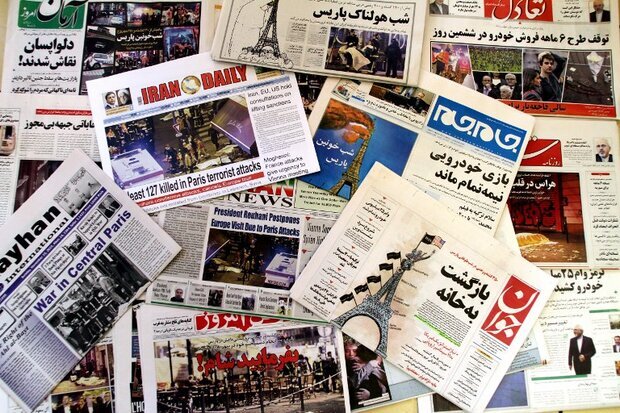Both Iran, U.S. need to continue negotiations regarding the JCPOA

Since last September, when the JCPOA talks were interrupted, the West, based on some reports, has claimed that Iran has not fulfilled its obligations and claimed that Tehran is getting close to building nuclear weapons, Arman-e- Melli said, citing Ali Bigdeli, a political analyst.
"If we can solve the case with Mr. Grossi, our nuclear negotiations will probably start," Bigdeli noted.
Americans have behaved a little better towards us compared to Europe, maybe it is because Biden does not want more differences to arise between Iran and the U.S. and to push Tehran towards more enrichment. I can only say that Tehran and Washington will continue the negotiations because they both need a deal.
But now there are two debates, one is that the Americans are considering Plan A, but Mr. Amir-Abdollahian raised the second Plan B, which is the enrichment and its conditions, and we hope that the case will be solved with Mr. Grossi's visit.
Etemad: A hard trip in a hard condition
Iran says that the White House has sent a message to Tehran about the readiness of the United States to revive the JCPOA, which the United States rejected and announced that the revival of the JCPOA has not been on the agenda of the Biden administration for a long time.
At the same time, it seems that Europe and the United States, while expressing their disappointment with the revival of the 2015 JCPOA, are following a small JCPOA, which is a kind of temporary agreement.
The relationship between Iran and the West is going through its most critical days for two reasons:
1. The claim of Iran's military support to Russia in the Ukraine war.
2. The claim of suppressing protesters in Iran. These differences have practically pushed the negotiations to revive the JCPOA to the sidelines.
The differences between Iran and the IAEA in the field of safeguards, which have become one of the obstacles to the revival of the JCPOA in the last year and a half, have not only not been resolved, but have also increased.
The quantitative and qualitative development of Iran's nuclear program after the withdrawal of the United States from the JCPOA has increased the challenges faced by Iran and the IAEA.
In such a situation, it can be said that the visit of the IAEA Director General to Iran is taking place while the revival of the JCPOA has the least chance.
Aftab Yazd: Iran and Germany should be careful
Aftab Yazd writes: Following the expulsion of two Iranian diplomats by the German government, this time the Iranian government has decided to expel two German diplomats from Iran.
In response to the expulsion of two of its embassy employees, the German Foreign Ministry announced in a statement that the country expected Tehran to retaliate against Berlin's actions, but did not confirm it.
Mutual expulsion of diplomats, although is a natural reaction. It is based on a tit-for-tat move, but it seems that such actions should be done with caution in the current atmosphere of the international community.
In the report, Aftab Yazd advises Tehran and Berlin to manage the challenges in such a way that the occupation of the British Embassy in Tehran does not happen again.
Khorasan: Grossi's new opportunity in Tehran
Grossi's visit to Tehran is taking place while the nuclear negotiations have been stopped for six months and we are on the verge of convening the winter meeting of the IAEA's Board of Governors next week.
According to Khorasan, all these nuclear developments represent an important and great opportunity for Grossi to solve the nuclear tension.
Grossi Will return to Vienna on Saturday night. He should publish his safeguards report on Iran. The content of the report should be such that it does not give excuses to the European and American parties and does not close the way of interaction with Iran.
Vatan-e-Emrooz: German, get out!
European governments stand behind the terrorists.
For many years, the MKO has held rallies and gatherings without being included in the list of terrorist groups in Europe, Vatan-e-Emrooz wrote.
The separatists who are in Scandinavia are planning assassinations.
In the latest case, the death sentence for Jamshid Sharmahd, the leader of the Tondar terrorist group, has angered the German authorities.
After the announcement of the sentence of the dual-national terrorist, Olaf Scholz and the German Foreign Ministry reacted to it, and Germany called the two employees of the Iranian embassy Persona non grata and asked them to leave Germany.
Germany supports Jamshid Sharmahd while he has organized and implemented numerous terrorist acts against the people of Iran.
After a week, Iran expelled two German diplomats.
Western governments fully support terrorist groups and also interfere in Iran's internal affairs.
They try to advance their goals by granting citizenship to terrorists.
In a similar case, after British spy Alireza Akbari was arrested and sentenced to death, the British government also tried to intervene in the case citing Akbari's British citizenship.
However, the Islamic Republic of Iran has repeatedly announced that it does not recognize dual citizenship for any Iranian.
Leave a Comment